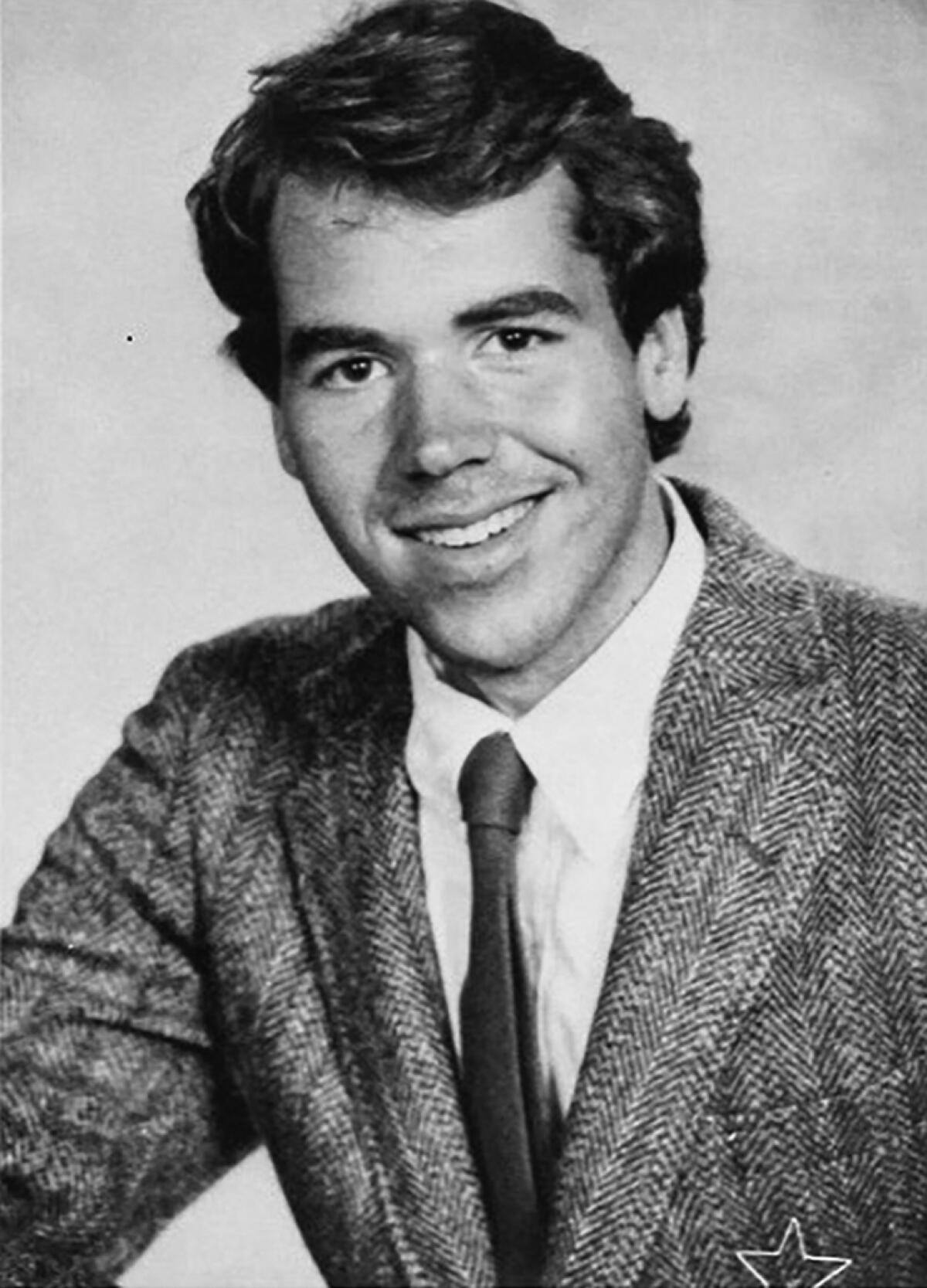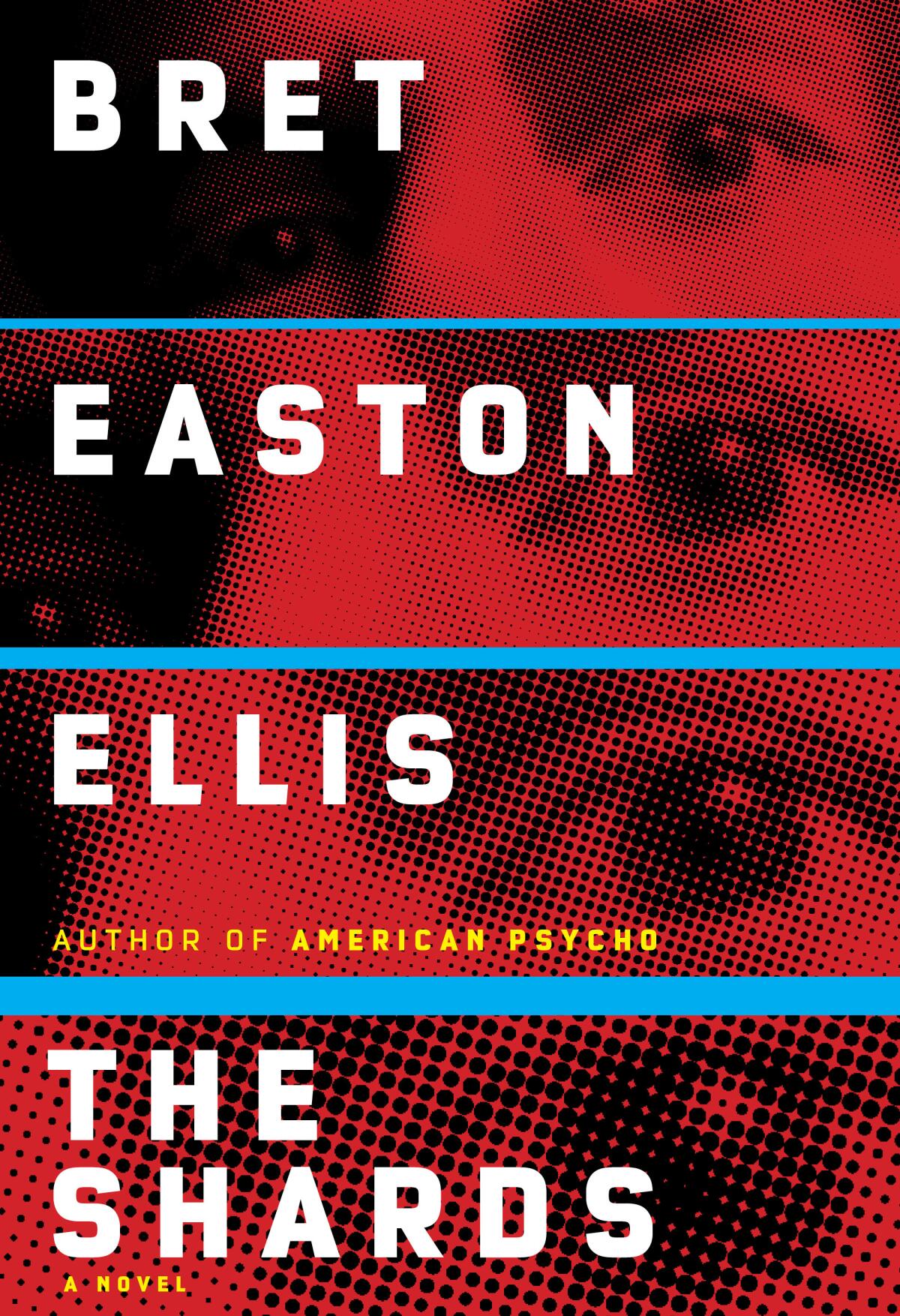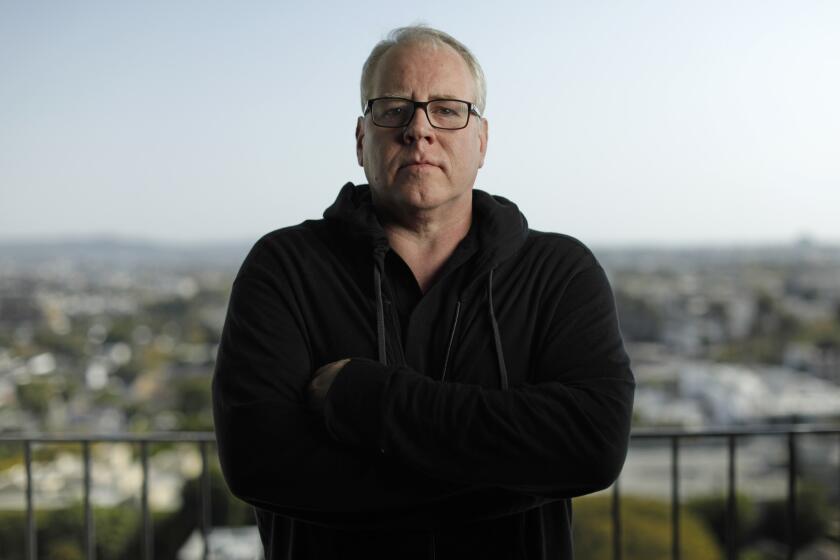Can Bret Easton Ellis bring back the (fictional) glory days?

- Share via
Review
The Shards
By Bret Easton Ellis
Knopf: 608 pages, $30
If you buy books linked on our site, The Times may earn a commission from Bookshop.org, whose fees support independent bookstores.
“The Shards,” the seventh novel by Bret Easton Ellis, is a paranoid slasher-thriller epic. It’s also an experiment in autofiction, set during the senior year of one “Bret Ellis” at a private L.A. prep school. And it comes with an extra frisson of literary intrigue. It’s been 13 years since his last novel, during which time he’s grown skeptical of both the form and its waning readership. He made a web series and has written a couple of terrible horror movies. His cranky but freewheeling podcast seemed gradually to become his main focus. Can Ellis now rediscover some of the old magic of “Less Than Zero” and “American Psycho”?
Fall 1981. Our hero and his friends at the Buckley School cruise the San Fernando Valley, watch movies, take drugs, hook up. Bret is in a listless relationship with Debbie Schaffer, the daughter of a Hollywood producer, and sleeping with two of his male classmates. He’s started to write what will become his first novel, “Less Than Zero.” (There’s enough in “The Shards” that probably did happen to cast a kind of uncanny doubt over what surely didn’t.)
The action shifts gears with the arrival of Robert Mallory, a mysterious new boy who immediately ingratiates himself with the Bret set. However, Bret is convinced he’s seen him before and can’t understand why Robert would lie about it unless he has something to hide. The coincidence of Robert’s advent with a series of break-ins and the gruesome vandalism of Buckley’s mascot strikes him as cause for suspicion. Gradually, he comes to believe Robert has something to do with the “deranged cult” haunting the Valley — and perhaps the disappearances of high schoolers rumored to have fallen victim to a serial killer known as the Trawler.
“Not Donald Trump again,” Evelyn Richards moans about halfway through “American Psycho,” Bret Easton Ellis’ biting satire of the Reagan ‘80s.
Bret’s paranoia and Robert’s disruptive presence drive the plot from there, and it all unravels like a kind of ultraviolent YA novel, “Beverly Hills, 90210” meets “Henry: Portrait of a Serial Killer.” Mercifully, Ellis’ writing elevates the material above his recent movie efforts, notably the tedious “Smiley Face Killers,” which shares some of the same themes. Both Ellis and the Bret of “The Shards” are Joan Didion fans, and her chilly, measured prose is a clear influence. “People were missing. Children were missing. Parents were missing. Those left behind filed desultory missing-persons reports, then moved on themselves.” This line from “Slouching Towards Bethlehem” could easily be the epigraph to “The Shards.”
The unease that saturates Didion’s most famous work also permeates Ellis’ novel, from the first day of school, when “everything seemed in slow motion, fragmented, haunted, vibrating with low-level anxiety,” to the dread that overwhelms Bret at homecoming. And the flatness of affect that defined the protagonists of “Less Than Zero,” inspired in part by Didion’s “Play It As It Lays,” once again guides Ellis’ characterization. Bret’s friends Thom and Susan and Debbie and Ryan are all rendered in the same two-dimensional style: To these cardboard cutouts in Wayfarers, “everything was cool, everything was chill, everything was a mild wow.” Ellis’ paratactic sentences compound the impression that life for them is just one thing after another. When a friend dies, “It sucks.”

This is actually kind of a problem for “The Shards,” Ellis’ longest novel. It’s one thing if characters are performatively vacant or vacuous — “American Psycho” and “Glamorama” are long too, but in those books it’s a joke that no one can keep the characters straight. Without the satirical flourishes, there’s often little to hold onto as the schooldays and coke parties and sex scenes drift by. Though the vibe is well sustained, it feels at times like a miniseries that should have been a movie.
In fact, it was a miniseries of sorts; “The Shards” was initially serialized on Ellis’ podcast, where it arguably worked better. He’s a terrific reader of his own work, and the podcast format let him lean into the book’s true-crime pastiche. The occasional editorial intrusions seemed less out of place there too — particularly his gripes with the so-called woke agenda. In 1981, he avers, there were no school shooters, no one was on meds, no one was a snowflake, security at LAX was lax and there was still a Tower Records on Ventura Boulevard.
Twenty-five years later, he catches up with the characters from his breakthrough. Hmm. They’re a lot like their author.
Perhaps the most pointed intrusion of Bret the Contrarian is a sequence in which he finds himself sexually entrapped by Debbie’s father, Terry Schaffer. Though it also serves a plot function, it seems to have been included principally to allow Bret to disavow his own victim status, as if to say “not me too:” “You did this to yourself, I thought … yes, I was technically ‘underage’ but no one had hurt me, I hadn’t been assaulted, I let it happen.”
How seriously to take such provocations will be at the reader’s discretion. Are these the views of “Bret” or of Ellis?
Fiction and reality in his work have always been fungible. As early as “Less Than Zero,” an interview with the then-20-year-old Ellis in this paper noted, despite his protestations, the “distinct parallels” between the lives of his characters and their creator. His second novel, “The Rules of Attraction,” was set in a college clearly modeled on Bennington, where he was studying when it was published. Ellis has claimed variously that Patrick Bateman in “American Psycho” is based on himself and on his father.
Over time, the books have acquired the qualities of a palimpsest, with layers visible beneath the surface to the observant (or obsessed). “Bret” first became the protagonist in “Lunar Park,” a “mock memoir” that riffed on his bad-boy literary reputation before morphing into a haunted house story and meditation on his father’s death. The “Less Than Zero” sequel, “Imperial Bedrooms,” opened with the revelation that the first book’s narrator had been ventriloquized by a different “author,” a figure “who floated through our lives and didn’t seem to care how flatly he perceived everyone.” Might we read the Bret of “The Shards,” so preoccupied with “numbness as a feeling,” as the author of this “Less than Zero”? It’s a thought.
Careful readers and fans will find much to play with in the sandbox of “The Shards.” Robert Mallory shares a first name with Ellis’ real-life father. What might this mean, given that Robert Ellis was, as the author has suggested, an abusive presence in his early life? Is it significant when Bret picks up the phone to Terry Schaffer and mistakes him for his dad? Or that the fictional Terry dies around the same time as Bret’s real father? As we read, meanings flip like tarot cards.
“Not Donald Trump again,” Evelyn Richards moans about halfway through “American Psycho,” Bret Easton Ellis’ biting satire of the Reagan ‘80s.
The question of Ellis’ sincerity is — rightly, thankfully — insoluble. “I’ve found out that many followers of the Official and Verified @BretEastonEllis enjoy it mainly because they think it is a parody account,” he once tweeted. His work isn’t programmed to answer questions about intention or what’s really happening. Ellis is and has always been in the business of mood: literature as playlist, as locker-room fantasy, as script treatment. That can work well in 200-page zingers like “Less Than Zero” or “Imperial Bedrooms.” At 600-pages-plus, “The Shards” is a harder sell, however sun-drenched and blood-soaked it may be. If you’re interested in the semiotics of Ultravox or the quickest route to Malibu, you’re in for a great time. But “The Shards” lacks the delirious absurdism and the tight control of Ellis at his best. For all its porno doominess, it often elicits little more than a mild wow.
Arrowsmith is based in New York and writes about books, films and music.
More to Read
Sign up for our Book Club newsletter
Get the latest news, events and more from the Los Angeles Times Book Club, and help us get L.A. reading and talking.
You may occasionally receive promotional content from the Los Angeles Times.











